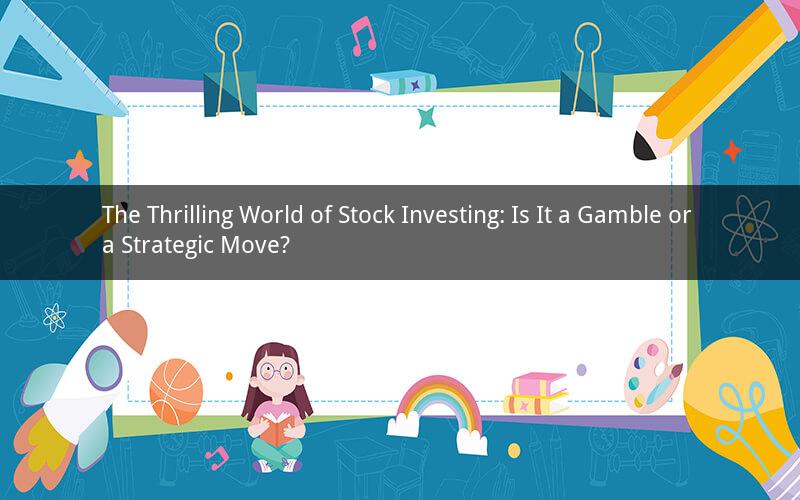
In the ever-evolving financial landscape, stock investing has become a popular avenue for individuals seeking to grow their wealth. However, some critics argue that it is nothing more than stock gambling. This article delves into the intriguing question of whether investing in stocks is indeed a form of gambling or a strategic approach to financial growth.
1. What is stock investing?
Stock investing involves purchasing shares of a company, which represents ownership in that company. Investors can buy and sell these shares on the stock market, aiming to profit from the price fluctuations or the company's growth.
2. Is stock investing a gamble?
While there are elements of risk involved in stock investing, it is not necessarily a gamble. Gamblers typically place bets on random outcomes without considering the underlying factors that influence the outcome. In contrast, investors in the stock market analyze various factors, such as the company's financial health, market trends, and economic indicators, to make informed decisions.
3. Factors influencing stock prices
Several factors can influence stock prices, including:
- Company performance: A company's financial statements, earnings reports, and business operations can significantly impact its stock price.
- Market sentiment: The overall perception of investors towards a particular stock or the market as a whole can drive prices up or down.
- Economic indicators: Macroeconomic factors like interest rates, inflation, and GDP growth can affect the stock market.
- News and events: Significant news, such as mergers, acquisitions, or political events, can cause stock prices to fluctuate.
4. Strategies for successful stock investing
To succeed in stock investing, individuals can adopt the following strategies:
- Diversification: By investing in a variety of stocks across different sectors and geographies, investors can reduce their risk.
- Research and analysis: Conduct thorough research on companies and market trends to make informed decisions.
- Long-term perspective: Patience and a long-term perspective can help investors ride out market volatility and benefit from long-term growth.
- Risk management: Set clear risk tolerance levels and use stop-loss orders to limit potential losses.
5. The role of luck in stock investing
While luck can play a role in stock investing, it is not the primary factor for success. Investors who rely solely on luck may experience significant losses. Instead, luck can be considered as a secondary factor that complements a well-thought-out strategy.
In conclusion, stock investing is not a gamble; it is a strategic approach to financial growth. By conducting thorough research, adopting sound strategies, and managing risk, individuals can navigate the stock market with confidence and potentially achieve their financial goals.
Questions and Answers:
1. Q: What is the difference between stock investing and stock gambling?
A: Stock investing involves analyzing various factors and making informed decisions, while stock gambling relies on luck and random outcomes without considering underlying factors.
2. Q: Can a person become wealthy through stock investing?
A: Yes, it is possible to become wealthy through stock investing. However, it requires knowledge, discipline, and patience.
3. Q: Is it necessary to have a financial background to succeed in stock investing?
A: While a financial background can be beneficial, it is not a necessity. Many successful investors have learned through experience and research.
4. Q: Can a person invest in stocks without using a financial advisor?
A: Yes, individuals can invest in stocks without a financial advisor. However, it is crucial to educate oneself and conduct thorough research to make informed decisions.
5. Q: How can a beginner start investing in stocks?
A: Beginners can start by opening a brokerage account, researching companies and market trends, setting clear financial goals, and developing a diversified investment strategy.